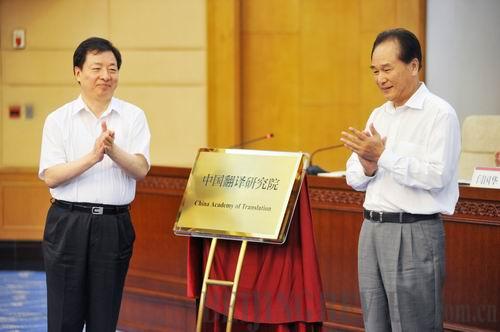|
 |
|
A NEW START: Cai Mingzhao (right) and Zhou Mingwei at the inauguration ceremony for the China Academy of Translation, held in Beijing on July 29 (WEI YAO) |
"Husband and Wife Lung Slices," "Tiger Skin Green Pepper," "Fired Lion's Head"—these strange names are not inventions, but rather real examples of poor translation seen gracing restaurant menus across China.
Word-for-word translations are common not only on the nation's menus, but even on public notice boards and at tourist attractions. Some institutes' official websites have been known to display similar errors, too.
"This is an urgent problem," said Zhou Mingwei, President of China International Publishing Group (CIPG). "Translation is very important in telling China's stories to the world."
Zhou made the statement at the inauguration ceremony for the establishment of the China Academy of Translation in Beijing on July 29. Nearly 200 people attended the ceremony, including government officials, university professors, and representatives from translation associations and publishers.
The academy, the first of its kind in China, aims to respond to many of the problems and opportunities that China is facing as it continues to open up to the outside world.
"Under the new circumstances, translation is becoming more and more important and is one of the foremost obstacles in introducing China to the outside world, participating in global dialogue, promoting the world's understanding of China and enhancing the friendship between China and people around the world," said Cai Mingzhao, head of the State Council Information Office, during the launch ceremony.
The academy aims to become China's top research platform for practitioners and scholars of translation both at home and abroad, focusing on bringing Chinese culture to the world through translation, Zhou said.
CIPG, with a decades-long history of producing foreign-language publications, hosted a group of the best translators in China and completed the translation of China's four ancient classic novels, including Journey to the West, Romance of the Three Kingdoms, Dream of the Red Chamber and Water Margin and many of the nation's other literary masterpieces, as well as important government documents.
Zhou noted that the newly established academy will tackle the key problems in effectively translating the keywords of major current affairs in China and build a talent pool of skilled translators and a body of expressions with Chinese characteristics, such as political terms, culture-loaded words and terminology used in traditional Chinese medicine.
"There is a yawning chasm between market demand and qualified translators," said Tang Wensheng, Executive Vice President of the Translators Association of China at the ceremony.
Tang revealed that through the end of June 2014, the number of translators that had passed the preliminary and intermediate level of translation certificate exams, authorized by the Ministry of Human Resources and Social Security, was only 36,000—far less than what the market needs.
In this regard, Zhou said that besides growing the translation talent pool, the academy also plans to improve the current evaluation system for translators and translation projects through awards.
Bao Chuanyun, former Dean of the Graduate School of Translation, Interpretation and Language Education of the Monterey Institute of International Studies in the United States, said good translation can only come from a knowledge of different cultures.
"Take Chinese writer Mo Yan's novels for example," said Bao. "Some words—and even the plot—are modified in translated versions to help non-Chinese readers understand the story better. The quality of the translations definitely contributed to him winning the Nobel Prize."
"Another issue is that Chinese translators are likely to put more focus on important or famous figures from China," said Bao. "But it is the stories of ordinary people that are most interesting to people from outside China."
Email us at: yuanyuan@bjreview.com | 